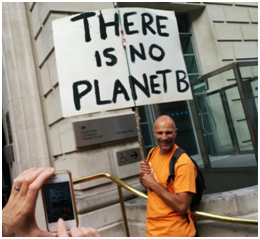The Church and the Economic Sphere 2 – R. Ward Holder
 I was at a meeting of Presbyterians a few weeks ago. I realize the redundancy of writing “meeting of Presbyterians,” but I was actually there. And one presenter was reporting on the experience of having participated in the recent march in New York that asked for a coherent response to climate change. He characterized that effort as being an endeavor to address the single most pressing issue that faces the church in the twenty-first century. He reminded his audience the pithy wisdom of one of the placards, that there is no “Planet B.”
I was at a meeting of Presbyterians a few weeks ago. I realize the redundancy of writing “meeting of Presbyterians,” but I was actually there. And one presenter was reporting on the experience of having participated in the recent march in New York that asked for a coherent response to climate change. He characterized that effort as being an endeavor to address the single most pressing issue that faces the church in the twenty-first century. He reminded his audience the pithy wisdom of one of the placards, that there is no “Planet B.”
I reflected on his passion, and on whether I agreed that this was actually the most pressing issue facing the church. I wanted to agree, and certainly believe that this is important. But I was struck by the notion that there is a deeper root cause that Christians must address – our ongoing love affair with capitalism. As long as we seek a free and unfettered capitalist global market, efforts to put change in place in one country or region or continent are bound to fail.
For a long time, we have entertained the notion of love being blind. Joe Jackson famously satirized that tendency in his 1978 hit, “Is She Really Going Out with Him?” in which he observed “They say that looks don’t count for much/ If so, there goes your proof.” But while Jackson’s lovelorn lyric got him onto the US and UK pop charts for the first time, his point resonates still today. While love may cover a multitude of sins, it is not supposed to blind the lover or the beloved to faults, to areas of concern, or to abuses. But that’s exactly what has happened. The church is so blind to this love that it cannot have a prophetic voice.

We have lost the ability to separate ourselves from the culture in which we are found, even if only for a moment, in order to accept the message of the gospel that may be calling us back from the abyss. I remember back in 1989, I was given a tape of a sermon by Stuart Briscoe on Acts 2. Briscoe was the lead pastor at Elmbrook, the Milwaukee take on megachurches. I popped the tape into my stereo, and sat down with coffee to hear a sermon, something that most pastors don’t get much chance to do. Briscoe was all the things that my seminary professors had advised us to be, confident and charming and blessed with a wonderful accent. But after the reading of the end of the chapter, things began to go awry. Briscoe immediately took up the question of whether the Lord would allow the church to be communistic. Since the answer was clearly no, since communists are godless, the interpretation of the Acts community as a radically egalitarian community in which the members sold their possessions and would distribute the proceeds to the members of the community as any had need had to be re-considered in light of what was known to be economic truth.
The church has not markedly progressed from that point over the course of the last thirty years. Time and again, the wisdom that this is the best situation for the faithful as well as those who have no faith goes unchallenged by the institutional church. Sometimes, this is justified on the theme of the effect of rising tides. Since a rising tide raises all boats, the goods delivered by an enormously effective and almost wholly globalized economy guarantee the certainty of a number of outcomes that Christians and other persons of good will seek. Philanthropists will have more to give (see my last post), churches will be able to reach out even more, and there will be fewer poor who need the healing balm of compassionate Christianity.
It is interesting that this argument still has legs in the midst of the present “economic recovery,” that has brought corporate profits back to pre-Great Recession levels and even beyond, while leaving a good number of workers unemployed. The term “jobless recovery,” as oxymoronic as any could be, is no longer remarkable (look here and here for a couple examples).
Pavlina Tcherneva of Bard College points out that the “economic recoveries” are being increasingly used up by the top ten percent of wage earners.
That tendency has become so strong that in the last “recovery,” the top wage earners made more in the recovery while the lower 90% continued to see their incomes shrink.
In the midst of this economic reality, one waits in vain to hear the mainline churches or evangelical churches suggest that something is systemically wrong. The new pope has gone on record in decrying the present situation, but systematic change has neither been proposed nor attempted. Many seem to suggest that this is the best that can be done. But is that our calling?
Christians are called to live the truth of the gospel, to find ourselves in the truer reality that the Paul called the heavenly citizenship. (Philippians 3.20) One of those claims we make is that humanity is made in the image of God (Genesis 1.27). Theologians have argued about what that meant, whether the image in humanity was rationality, or compassion, or love. But more recently, several voices have agreed upon the necessity of seeing the imago Dei as being necessarily trinitarian.[1] All of these authors see the importance of seeing the complete trinity in action in the creation of humanity, and each suggests that the nature humanity receives from God’s trinitarian action sets the parameters for human action.
Michael and Kenneth Himes concentrate upon this to the greatest extent, building a theory of human rights from the radical trinitarian character of God’s image in all humans. They use the social analogy for the trinity, that God is lover, beloved, and the love that binds them together. Thus, for Himes and Himes, for God, to be is to love. This is the inner life of the trinity, a completely giving and gracious love. That character is stamped in the basics of what it means to be human. The Himes brothers then argue that this means that humans are, at our deepest level, formed for community. That means it is basic to who we are to provide for those created in God’s image a standard of living and even thriving.
The question that faces us now is whether we can speak and act against the very economic system that has benefitted so many of us, because of what it does to God’s children? And if we cannot, are we giving up our claims on God, or just denying God’s claims on the billions for whom this economy necessarily fails?
R. Ward Holder is a historical and political theologian, and professor of theology at Saint Anselm College in Manchester, New Hampshire. He is an ordained teaching elder in the Presbyterian Church (USA) and serves as moderator of the Presbytery of Boston. He writes on John Calvin, biblical interpretation, and the manner in which religious convictions shape modern politics and political theory. His most recent work was co-edited with Peter B. Josephson, The American Election 2012: Contexts and Consequences (Palgrave – 2014). He holds a bachelor’s degree from Cornell College, a master’s in divinity from Princeton Theological Seminary and a doctorate in theology from Boston College.
[1]See Daniel L. Migliore, Faith Seeking Understanding, 3rd ed. (Grand Rapids: Eerdmans, 2014); Elizabeth Johnson, Quest for the Living God: Mapping Frontiers in the Theology of God (New York: Bloomsbury, 2007); and Michael and Kenneth Himes, Fullness of Faith: The Public Significance of Theology (Mahwah, NJ: Paulist, 1993).
